Skating for Justice
Bridie Farrell was a promising 15-year-old speedskater when she started training with Andy Gabel, one of the sport's most decorated athletes. Now, more than 15 years later, she's opening up about disturbing allegations of misconduct— and raising unsettling questions about whether Olympic officials are doing enough to protect athletes from abusive coaches and competitors.
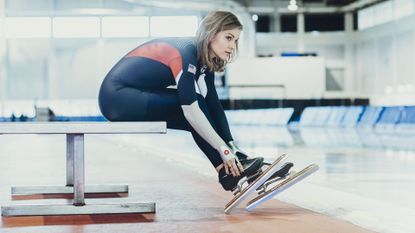
INSIDE THE UTAH OLYMPIC OVAL, an indoor speedskating arena just outside Salt Lake City, a few dozen of America's top speedskaters whip around a gleaming track, bent over at the waist, digging their blades into the ice for speed. Lap after lap, they are a blur of black, gray, red, white, and royal blue—the colors of current U.S. Speedskating Lycra uniforms. But one skater stands out in her weathered dark blue suit, a relic from the 2001 national team. The white USA letters running down Bridie Farrell's right leg are cracked, the Nike logo on her knee is worn and peeling.
At 31, Farrell is herself a relic. Though she has set American short-track records in the 3,000-meter relay, as well as the 1,500-meter and 3,000-meter individuals—the last of which she still holds more than a decade after she set it—she has never competed at the Olympics, having failed at attempts to qualify for spots on the 1998, 2002, and 2006 teams. After that last effort, she hung up her skates for good—that is, until the fall of 2012, when she decided to give it one more shot. (This time around, she's switched to long track, competing on a 400-meter oval versus a short track's 111-meter oval.) As Farrell finishes a lap, hands on hips and heaving for breath, she glides across the ice to where the coaches are huddled and asks about her time. Thirty-four seconds—a dramatic improvement from just two weeks ago but still two seconds slower than most of the other women on the ice this day. "If I were one of these other girls skating my lap times, I'd hang it up," she tells me later.
But Farrell isn't like the other girls. None of them are barreling up against the limits of age after six years away from the sport. And none of them are doing so wrapped in controversy. Though Farrell's return to speedskating was unexpected, nobody was quite prepared for the revelation that followed. During a radio interview with an NPR affiliate in February, Farrell alleged that her former mentor, Andy Gabel, one of speedskating's most acclaimed stars and once its most powerful official, had sexually abused her when she was 15. Her announcement stunned the speedskating world. Coaches, athletes—everyone knew or knew of Gabel. Up until this past September, a poster of him skating in his prime hung prominently in the window of the gift shop at the Utah Olympic Oval. Farrell passed it every day on her way to the rink.
Raised in Saratoga Springs, New York, Farrell began speedskating when she was 6. "I've always loved going fast," she says. As she got older, her commitment to the sport intensified. Her little sister, Colleen, remembers Farrell getting up at 5 a.m. to train. While Colleen watched TV after school, Farrell would keep her company while furiously pedaling on an exercise bike. At age 12, Farrell was the third-fastest short-track speedskater in the country for her age. By 15, she had real prospects for one day making the national team.
That summer, Andy Gabel, then 33, moved to town to train for the upcoming 1998 Olympic Trials. Gabel was the Michael Jordan of short-track speedskating. He'd already been on four Olympic teams, winning a silver at the 1994 games in Lillehammer, Norway. Though he'd coached in the past, Gabel was in Saratoga Springs strictly to prep for the upcoming trials. Farrell, about to start 10th grade, was starstruck. Gabel took a quick interest in her, offering to help with her skates. Despite the skates' outward simplicity—a low-cut boot bolted to a single blade—aligning and sharpening the blades is tricky, and Farrell was grateful for the help. She also needed a ride to the rink and Gabel was there, happy to pick her up at 5 in the morning. "We would go skating alone during the day. I remember just doing circles in the middle of the ice and Andy would tell me about my turns and help me. He would always ask me what I ate," Farrell recalls. Though she had her own coach, she describes Gabel as her "informal coach" during the time he spent in Saratoga Springs. "He even gave me my lap times during the 1998 Olympic Trials."
One day that summer, alone in the car with Farrell, Gabel drove down a dead-end street and stopped. She says he asked if he could kiss her. "I was just frozen. I knew if I said no, I'd have to get out of the car and walk home and my parents would ask, 'Why are you walking home?'"
According to Farrell, Gabel kissed her, and it went on from there. Soon, he was taking her out for lunches and dinners. He let her drive his Lexus. He gave her pricey Oakley sunglasses. They started going to his house together. Though they never had sex, he would put his fingers inside of her, Farrell says, while placing her hands on his genitals. He always told her not to tell anyone, she says.
Stay In The Know
Marie Claire email subscribers get intel on fashion and beauty trends, hot-off-the-press celebrity news, and more. Sign up here.
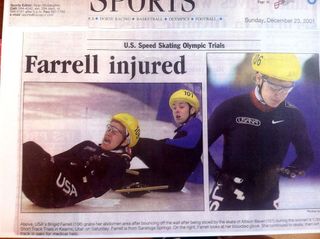
In the ensuing weeks and months, Gabel became controlling and demanding. Farrell recalls he told her she was fat and scolded her for eating peanut butter and jelly sandwiches at school instead of drinking vegetable juice. When she wanted to go to the homecoming dance with another student, she first cleared it with Gabel, who allowed it, provided she came home early. "My mom and dad thought, Oh, she wants to get up and train the next morning," Farrell says. "Even my friends thought it was for training. No one knew the leash that I was on."
After he'd qualified for the 1998 Olympic team headed to Nagano, Japan, Gabel left Saratoga Springs for good. Nagano was a bust for him, and he retired not long after. Still, having racked up more than 75 medals in international competitions over the course of his nearly 20-year career, Gabel was a speedskating legend. He became vice president of U.S. Speedskating, the governing body of the sport, and then its president from 2002 until 2006. In 2003, he was inducted into the National Speedskating Museum and Hall of Fame in Milwaukee. He sat on the board of directors of U.S. Speedskating until 2010 and was the chairman of the short-track technical committee with the International Skating Union. In 2010, NBC hired him as a short-track speedskating commentator for the Vancouver games.
Farrell's career proved far less illustrious. Though she went on to race for the national team, she fell short at the trials for the 2002 Olympic team. In the years that followed, she was plagued by injuries. By the time the trials for the 2006 Olympics rolled around, Farrell was all but hobbled. She didn't even bother to find out how she placed, just that she didn't make the team. After that, she retired from speedskating and headed to Cornell University, where she graduated with a degree in applied economics in 2008. Later she moved to New York City and tried to start over.
But without speedskating, Farrell felt unmoored and fell into a deep depression. She thought of suicide constantly, of jumping out of her apartment window or throwing herself in front of a train. It went on like that until September 2012, when a despondent Farrell arrived in Saratoga Springs for a visit. Her mother, desperate to help, asked her what she could do. "Just kill me," Farrell told her.
THE TRAJECTORY of an Olympian is legendary, thanks to the seemingly endless loop of tear-jerking profiles broadcast on network television during the games: the countless predawn hustles to practice; weekends and holidays logging time at the gym; every meal, every rest, every injury a metric in the careful calculus of victory. For much of their training, Olympic contenders lead cloistered lives, usually surrounded by other athletes and coaches in a competitive hothouse designed to draw the best performances from them, day in and day out. Under such intense conditions, with coaches and competitors spending inordinate amounts of time together—eating together, traveling together, even living together—is it any wonder that elite athletes are so vulnerable to abuse?
While actual data on athlete abuse is scant, a 2002 Australian study found that 31 percent of that country's female athletes had been sexually abused—the more accomplished they were, the more likely they were to have been victimized by someone linked to their sport.
In fact, there are numerous cases of athlete abuse in a wide cross section of sports. Rick Curl, one of the nation's top swim coaches, who has trained many Olympians, including 1996 and 2000 Olympic gold medalist Tom Dolan, was this year sentenced to seven years in prison for child sexual abuse. Kelley Davies Currin, a former top swimmer, accused him of sexually abusing her for several years, beginning when she was 13. (Curl is appealing his sentence.) Currin says her relationship with Curl was an open secret in swim circles and that USA Swimming's executive director, Chuck Wielgus, knew about the abuse and did nothing. (USA Swimming spokesperson Karen Linhart denies that Wielgus knew of Currin's abuse, and says that Currin circumvented the group to reach a settlement with Curl.)
In 2011, Kayla Harrison, America's sole gold medalist in judo, revealed that she'd been sexually abused by her coach, Daniel Doyle, for three years, starting when she was 13. Her testimony ultimately helped convict Doyle, who is currently serving out a 10-year prison sentence.
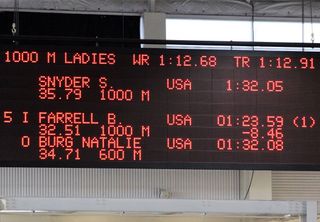
Ten women have sued USA Swimming in the past five years, claiming that the organization knew about their harassment and abuse by coaches but failed to do anything about it, according to California attorney Robert Allard, who represents a number of the alleged victims. As a result, they say, coaches operated with impunity, moving from town to town, swim club to swim club, preying on their unsuspecting young charges. Among them: Andy King, a top juniors swim coach for numerous clubs along the West Coast, who was sentenced to 40 years in prison in January 2010 after authorities uncovered decades of sexual abuse involving more than a dozen girls. In fact, USA Swimming has banned 64 members, including coaches, officials, and athletes, for sexual misconduct between 1999 and 2012. In a statement to Marie Claire about the matter, Linhart wrote, "USA Swimming has no tolerance for violations of our code of conduct, and we are committed to investigating claims and ridding our sport of abusers."
Since Bridie Farrell went public with her story, another alleged victim of Andy Gabel's has come forward. Nikki Meyer, a silver and bronze medalist from the 1992 and 1994 Olympics who competed using her maiden name, Ziegelmeyer, was 15 when she met the then-26-year-old Gabel in 1991. She had recently arrived at the U.S. Olympic Education Center (USOEC), based at Northern Michigan University in Marquette, where she was enrolled in its prestigious speedskating program. It was the Missouri native's first time living away from home, and she was much younger than anyone else in the program. When she had trouble with her skates, her coach advised her to see Gabel, who was then the coordinator of the USOEC's short-track speedskating program. (He was a coach and administrator as well as a competitor.) The skaters and coaches lived in the same dorm, so Meyer went to Gabel's dorm room. After he invited her in, she says he threw her on the bed and raped her, an allegation first reported by The Associated Press. "If you tell anyone, they will not believe you," she says he told her afterward.
Still, Meyer immediately told teammates that she'd been assaulted—nearly everyone thought she was making it up. Her roommate at the time, Lexie Bonitatibus, kept a journal in which she detailed conversations with Meyer during this period. A page of that journal was shared with Marie Claire and another publication. "Nikki and I had a very serious discussion about some very horrible things that Andy is doing to her," Bonitatibus wrote. "He is playing with her mind and messing with her body without her permission … Poor Nikki, she is really scared and she cries a lot."
Meyer says she fended off continued advances by Gabel for months, but "he eventually broke me," she says. They had an ongoing sexual relationship until she was 18. It was so well-known, she says, that when she was 17 and Gabel was 29, they were assigned a room together for the 1993 World Championships in China. "When I read Bridie's story [in the newspapers], it was textbook to what had happened to me," Meyer says.
In a written statement to the Chicago Tribune in March, Gabel has acknowledged having "inappropriate" relationships with young athletes. "I never forced myself on any individual, and any allegations of that nature are absolutely false," he wrote. "Looking back on it now, I understand that my conduct nearly 20 years ago, and longer, was still inappropriate. I've apologized publicly for that, and I am sorry for crossing that line." Gabel refused to comment for this story, though his attorney, Donald Campbell, sent a letter to Marie Claire in which he said, "The events are alleged to have taken place over fifteen years ago … Ms. Farrell's recently minted allegation of 'molestation' only emerged when she sought publicity for her efforts to renew her career in speedskating."
Did U.S. Speedskating know about Gabel's conduct? That's unclear—U.S. Speedskating won't respond to requests from Marie Claire regarding Gabel until an outside law firm completes its own investigation. (U.S. Speedskating won't say when that will be.)
But there were certainly questions about Gabel's relationships with young athletes. In the spring of 1990, about a year before Meyer says she was raped and seven years before Gabel met Farrell, a boxing coordinator at Northern Michigan University contacted Roger Counsil, who then oversaw the USOEC program at the university, raising concerns about Gabel's relationship with a young skater. According to the university's investigation, the boxing coordinator said he'd seen a "rather young girl" leaving Gabel's room at around 2 a.m., carrying a blanket and crying. On another occasion, he saw Gabel giving the girl a back rub. Also according to the report, when the team traveled to Italy for a competition, Gabel's roommate told another skater that the girl came into their room one night and was "rustling" under the covers with Gabel for an unusually long period of time. (In his statement, that roommate wrote that while the girl often visited their room to take naps and give massages, he never actually saw them engage in any sexual activity.) The report also notes that Gabel was said to have bragged about receiving oral sex from a 14-year-old girl, and that someone had taped a note to Gabel's door reading "15 gets you 20"—meaning sex with a 15-year-old gets you 20 years in prison.
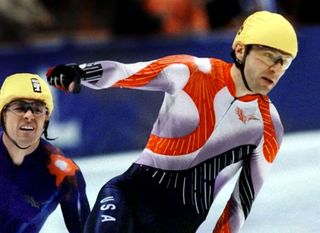
Even Nikki Meyer's mother, who chaperoned a USOEC juniors program at Northern Michigan the summer before her daughter enrolled there, says she also saw a young girl emerge from Gabel's room late one night. She reported it to the other chaperones but says she was told to mind her own business. "I remember my mom told me not to trust him," recalls Meyer. "I just thought, Mom, whatever."
Nonetheless, after an investigation, the Northern Michigan report concluded that the allegations against Gabel could not be substantiated, and no actions were ever taken against him. Neither U.S. Speedskating nor the U.S. Olympic Committee (USOC) will say whether they received that report or even knew of the investigation.
After Farrell and Meyer came forward, U.S. Speedskating retained the Chicago-based law firm Sidley Austin to investigate the claims against Gabel. As of October, Sidley Austin had yet to release its report. Gabel, who now runs a Las Vegas–based medical equipment company, nonetheless resigned from his powerful post at the International Skating Union and from the U.S. Speedskating Hall of Fame Committee.
U.S. Speedskating isn't eager to discuss Farrell's claims. Shortly after I arrived at the Utah Olympic Oval to meet Farrell, Tamara Castellano, U.S. Speedskating's spokesperson at the time, forbade me from speaking to anyone but Farrell while I was there. She insisted on being on the phone during an interview I did with one of Farrell's coaches (who does not even work for U.S. Speedskating) and warned me not to ask him questions about Gabel. The president of U.S. Speedskating, Mike Plant, has refused interview requests from Marie Claire. In an e-mailed statement, Plant said, "We have a support and service system in place—which includes access to the SafeSport initiative—to ensure athletes can focus all of their efforts and resources on training."
Launched in 2010 by the USOC in the wake of the physical- and sex-abuse scandals, the SafeSport program was created to address issues of abuse and harassment, as well as hazing, across all 47 sports that it oversees. All the governing bodies are required to adopt minimum standards by the end of this year. But the program, critics say, is riddled with loopholes and problems. While the governing bodies are required to ban romantic relationships between athletes and anyone in a "direct supervisory or evaluative" position, or in instances where there is a clear imbalance of power, SafeSport does not, for example, specify how or to whom a victim should report violations. There's also no formal policy outlining how abuse allegations are to be investigated, who investigates them, and what punishments are handed down in the event they are warranted. Each sport's governing body is required to inform coaches about the program, but there's no mention of informing athletes.
KATHERINE STARR, an Olympic swimmer for Britain who was raped by her coach when she was 14 (her coach was ultimately sentenced to 17 years in prison in the U.K. for raping two other swimmers), founded Safe4Athletes last year to push for more stringent policies that protect athletes from abusive coaches. Among its recommendations: Every sport club or program should have a volunteer "athlete welfare advocate" whom competitors can approach confidentially about any issue, and who can then solicit guidance and resources on behalf of the athlete. And rather than leaving the fate of coaches to the governing bodies, Safe4Athletes recommends cases of abuse be adjudicated by a panel comprised of one representative the athlete picks, one the coach picks, and one they mutually agree to. Already, an estimated 175 gymnastics clubs around the country, as well as the city of Philadelphia school system, have adopted the guidelines. Yet, Starr says the USOC has no interest in her program. "[SafeSport] protects the governing body, not the athlete," she says. "The investigations are weak. It looks like window dressing."
Since SafeSport is so new, it remains to be seen how effective it will be. But one recent case that was investigated after SafeSport guidelines were announced does not bode well for its success. In 2011, a member of the short-track team informed U.S. Speedskating that teammates were being emotionally and physically abused by their coach Jae Su Chun. But no one from U.S. Speedskating followed up on the claims, says one athlete. In March 2012, the athlete followed up with the USOC, which connected her with Malia Arrington, its newly minted director of ethics and safe sport. Arrington told the athlete that she needed to hear from other athletes to substantiate the claims, yet after those athletes contacted Arrington, they still heard nothing back. Over the next six months, more than a dozen athletes ultimately split from the national team, refusing to work with the coach. Arrington then recommended that U.S. Speedskating hire the law firm White & Case to investigate the claims—as well as an incident where a skater said the coach directed him to damage an opponent's skate. But that December, White & Case issued a report that found that the coach's alleged behaviors "do not constitute physical abuse, and collectively they do not constitute a pattern of abuse" and that there was not enough evidence to determine that the coach ordered the skate tampering.
Shortly after, the International Skating Union conducted an investigation into the skate-tampering incident. It found that the coach had created an intimidating training environment that led to tampering, but there was not sufficient evidence to conclude that he directly ordered it. It suspended Chun from international competition for two years, but by then he'd already resigned.
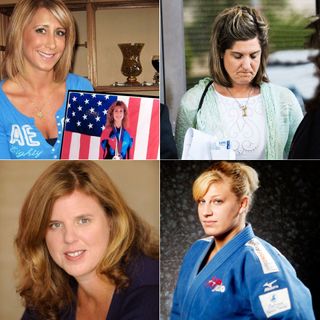
In an e-mailed statement, Arrington said that SafeSport had no role in White & Case's investigation and that, in general, the governing bodies are independent and that the "USOC does not investigate or resolve allegations of abuse or misconduct" made against them.
"It was insulting," says one athlete who asked not to be named for fear of retaliation. "Who was SafeSport protecting? It was protecting U.S. Speedskating's image. There is no one to make the governing bodies accountable."
A USOC task force is considering creating a separate, independent entity like the United States Anti-Doping Agency to investigate claims of abuse by athletes, but nobody's holding their breath. "It's a joke," says Jonathan Little, who represents several victims of abuse by coaches. "What I want is for all the governing bodies and the USOC to go after child molesters as aggressively as the U.S. Anti-Doping Agency went after Lance Armstrong. I appreciate the desire to kick out 20-year-old kids using drugs, but why can't men molesting young girls get the same priority?"
Sitting in her small studio apartment in an extended-stay hotel in Salt Lake City, Farrell tells me that she is happy with her decision to return to speedskating, though the sacrifices have been immense. She's not on the national team, which means she must pay for her own housing and training expenses, north of $1,800 a month. When she's not on the ice, she continues to work, selling life insurance for New York Life. During the day, when she's on a training break, she's usually got her face buried in her phone—every spare moment is an opportunity to connect with her clients.
The Olympic Trials on December 27 are Farrell's final hope for a comeback. Throughout September, her times continued to improve. Still, she remains a long shot. But Farrell's quest isn't about gold. It's about vindication, she tells me. Farrell wants Gabel banned from the sport and his name removed from the National Speedskating Hall of Fame. "Andy has done a lot for the sport, and he did help my skating, but there are some nonnegotiables in this world," says Farrell, who hopes that all the publicity she generates may help to right some of the wrongs and perhaps even deter another coach or competitor from taking advantage of a young, vulnerable athlete. "When people don't come forward, it helps these guys to get away with it. It took a lot for me to speak out, but what did I have to lose?"
According to Farrell, Gabel kissed her, and it went on from there. He let her drive his Lexus. They started going to his house together.
Andy Gabel, winning the short-track speedskating Olympic Trials in Lake Placid, New York, in 1998. LEFT: For a fleeting moment last March, Bridie Farrell held the lead in the 1,000- meter race for the American Cup.
"I appreciate the desire to kick out 20-year-old kids using drugs, but why can't men molesting young girls get the same priority?"
THE DARK SIDE OF GOING FOR GOLD (Clockwise)
Several athletes have emerged in recent years to reveal their stories of abuse at the hands of mentors and coaches
NIKKI MEYER
The two-time Olympic speedskater came forward this year with allegations that at age 15, she'd been raped by legendary speedskater Andy Gabel.
KELLEY DAVIES CURRIN
As a teenager, Currin was sexually abused by her Hall of Fame swimming coach, Rick Curl, who was later sentenced to seven years in prison for child sexual abuse.
KATHERINE STARR
At age 14, this two-time Olympic swimmer was raped by her coach, who was ultimately sentenced to 17 years in prison for abusing young athletes.
KAYLA HARRISON
Last year's gold medalist in judo reveal-ed she was sexually abused for three years, starting at 13, by her coach, Daniel Doyle. Doyle was sentenced to 10 years in prison.
-
 Women on ‘The Hills’ Were Put In ‘Compromised Situations’ Like ‘Blood Sport,’ Cast Member Lo Bosworth Says
Women on ‘The Hills’ Were Put In ‘Compromised Situations’ Like ‘Blood Sport,’ Cast Member Lo Bosworth SaysAs compared to its predecessor, ‘Laguna Beach,’ Bosworth said ‘The Hills’ had a “much bigger impact from a drama and trauma perspective.”
By Rachel Burchfield Published
-
 Emma Stone Has a Credit on Bestie Taylor Swift's 'Tortured Poet's Department'
Emma Stone Has a Credit on Bestie Taylor Swift's 'Tortured Poet's Department'Their decade-long friendship has been immortalized in Swift's discography for the second time.
By Quinci LeGardye Published
-
 Kourtney Kardashian Barker Loves Her Postpartum Body, Thank You Very Much
Kourtney Kardashian Barker Loves Her Postpartum Body, Thank You Very MuchAfter a body shaming troll tried to tear her down, she reminded them that her body “gave me my 3 big babies and my little baby boy.”
By Rachel Burchfield Published
-
 36 Ways Women Still Aren't Equal to Men
36 Ways Women Still Aren't Equal to MenIt's just one of the many ways women still aren't equal to men.
By Brooke Knappenberger Last updated
-
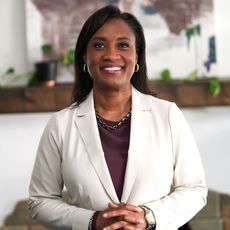 EMILY's List President Laphonza Butler Has Big Plans for the Organization
EMILY's List President Laphonza Butler Has Big Plans for the OrganizationUnder Butler's leadership, the largest resource for women in politics aims to expand Black political power and become more accessible for candidates across the nation.
By Rachel Epstein Published
-
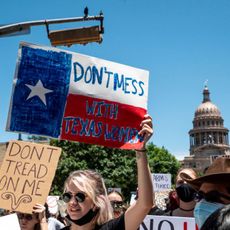 Want to Fight for Abortion Rights in Texas? Raise Your Voice to State Legislators
Want to Fight for Abortion Rights in Texas? Raise Your Voice to State LegislatorsEmily Cain, executive director of EMILY's List and and former Minority Leader in Maine, says that to stop the assault on reproductive rights, we need to start demanding more from our state legislatures.
By Emily Cain Published
-
 Your Abortion Questions, Answered
Your Abortion Questions, AnsweredHere, MC debunks common abortion myths you may be increasingly hearing since Texas' near-total abortion ban went into effect.
By Rachel Epstein Published
-
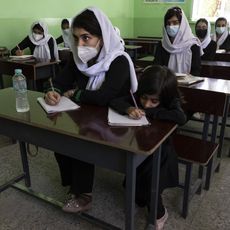 The Future of Afghan Women and Girls Depends on What We Do Next
The Future of Afghan Women and Girls Depends on What We Do NextBetween the U.S. occupation and the Taliban, supporting resettlement for Afghan women and vulnerable individuals is long overdue.
By Rona Akbari Published
-
 How to Help Afghanistan Refugees and Those Who Need Aid
How to Help Afghanistan Refugees and Those Who Need AidWith the situation rapidly evolving, organizations are desperate for help.
By Katherine J. Igoe Published
-
 It’s Time to Give Domestic Workers the Protections They Deserve
It’s Time to Give Domestic Workers the Protections They DeserveThe National Domestic Workers Bill of Rights, reintroduced today, would establish a new set of standards for the people who work in our homes and take a vital step towards racial and gender equity.
By Ai-jen Poo Published
-
 The Biden Administration Announced It Will Remove the Hyde Amendment
The Biden Administration Announced It Will Remove the Hyde AmendmentThe pledge was just one of many gender equity commitments made by the administration, including the creation of the first U.S. National Action Plan on Gender-Based Violence.
By Megan DiTrolio Published